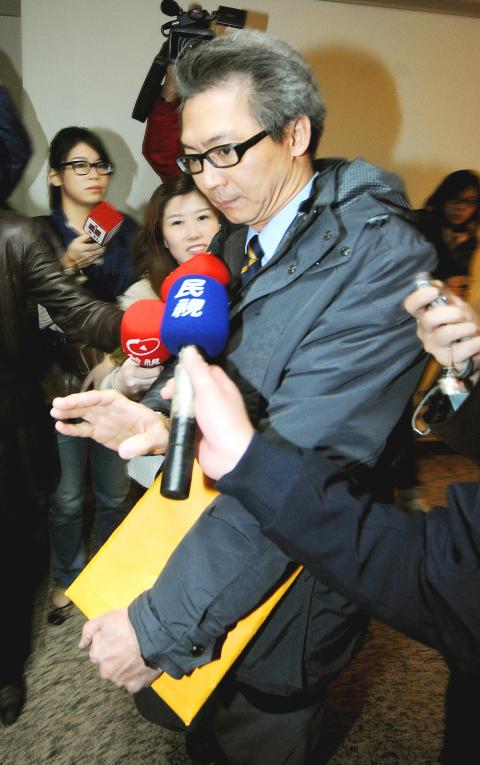Premier Sean Chen (陳冲) yesterday dismissed comments about rising NBA star Jeremy Lin’s (林書豪) success being attributable to his eating US beef, made by a member of the Cabinet task force convened to address the issue of imports of US beef containing ractopamine residue.
“Saying that NBA players play basketball well because they eat US beef is not a scientific argument,” Chen said. “We need evidence and [medical] literature to prove [such an argument.]”
Chen made the remarks in response to a report in the Chinese-language Apple Daily yesterday, which quoted Wang Jen-hsien (王任賢), director of China Medical University Hospital’s Department of Infection Control, as having told the task force on Feb. 10 when it convened its first meeting that “Jeremy Lin made it to the NBA because he eats US beef. Taiwanese couldn’t [make it to the NBA] because they don’t [eat US beef.]”

Photo: Liu Hsin-de, Taipei Times
Born and raised in the US, Lin is the first American of Taiwanese descent to play in the NBA. The performance of the new starting point guard for the New York Knicks over the past two weeks has given him an international following.
Elaborating on his remarks yesterday, Wang said he meant to highlight that the controversy over whether Taiwan should allow -imports of US beef products containing traces of ractopamine was a toxicological issue that “we lack a clear understanding about in the country.”
He said that ractopamine was mistakenly viewed as a highly toxic drug.
Ractopamine is a type of beta-agonist, a class of drugs that accelerate the maturation of animals and increases the lean meat ratio, Wang said in an op-ed article. Although ractopamine has not been approved for use in humans, other beta--agonists are used, for example bronchodilators, a medication used to treat wheezing in asthmatics or those who have influenza, he added.
The chance of being poisoned by consuming beef with ractopamine residues is very low because cattle excrete ractopamine within 24 hours of consuming the feed additive, which is as fast as it is excreted from the human body after people eat beef, Wang said.
Amid calls from the US to ease the ban, which have escalated since the Jan. 14 presidential election, the government set up an ad hoc task force on Feb. 6 to serve as a technical advisory committee to consider whether ractopamine in cattle or hogs poses a risk to human health.
Lin Chieh-liang (林杰樑), a toxicologist at Linkuo Chang Gung Memorial Hospital who was not invited to sit on the committee, disagreed with Wang’s comments, saying that the comparison of the relative health risks from ractopamine faced by Taiwanese and US meat consumers was incorrect.
Taiwanese eat more animal offal than Americans and there is a much greater and longer-lasting presence of ractopamine residue in viscera, Lin said.

US President Donald Trump yesterday announced sweeping "reciprocal tariffs" on US trading partners, including a 32 percent tax on goods from Taiwan that is set to take effect on Wednesday. At a Rose Garden event, Trump declared a 10 percent baseline tax on imports from all countries, with the White House saying it would take effect on Saturday. Countries with larger trade surpluses with the US would face higher duties beginning on Wednesday, including Taiwan (32 percent), China (34 percent), Japan (24 percent), South Korea (25 percent), Vietnam (46 percent) and Thailand (36 percent). Canada and Mexico, the two largest US trading

AIR SUPPORT: The Ministry of National Defense thanked the US for the delivery, adding that it was an indicator of the White House’s commitment to the Taiwan Relations Act Deputy Minister of National Defense Po Horng-huei (柏鴻輝) and Representative to the US Alexander Yui on Friday attended a delivery ceremony for the first of Taiwan’s long-awaited 66 F-16C/D Block 70 jets at a Lockheed Martin Corp factory in Greenville, South Carolina. “We are so proud to be the global home of the F-16 and to support Taiwan’s air defense capabilities,” US Representative William Timmons wrote on X, alongside a photograph of Taiwanese and US officials at the event. The F-16C/D Block 70 jets Taiwan ordered have the same capabilities as aircraft that had been upgraded to F-16Vs. The batch of Lockheed Martin

GRIDLOCK: The National Fire Agency’s Special Search and Rescue team is on standby to travel to the countries to help out with the rescue effort A powerful earthquake rocked Myanmar and neighboring Thailand yesterday, killing at least three people in Bangkok and burying dozens when a high-rise building under construction collapsed. Footage shared on social media from Myanmar’s second-largest city showed widespread destruction, raising fears that many were trapped under the rubble or killed. The magnitude 7.7 earthquake, with an epicenter near Mandalay in Myanmar, struck at midday and was followed by a strong magnitude 6.4 aftershock. The extent of death, injury and destruction — especially in Myanmar, which is embroiled in a civil war and where information is tightly controlled at the best of times —

China's military today said it began joint army, navy and rocket force exercises around Taiwan to "serve as a stern warning and powerful deterrent against Taiwanese independence," calling President William Lai (賴清德) a "parasite." The exercises come after Lai called Beijing a "foreign hostile force" last month. More than 10 Chinese military ships approached close to Taiwan's 24 nautical mile (44.4km) contiguous zone this morning and Taiwan sent its own warships to respond, two senior Taiwanese officials said. Taiwan has not yet detected any live fire by the Chinese military so far, one of the officials said. The drills took place after US Secretary